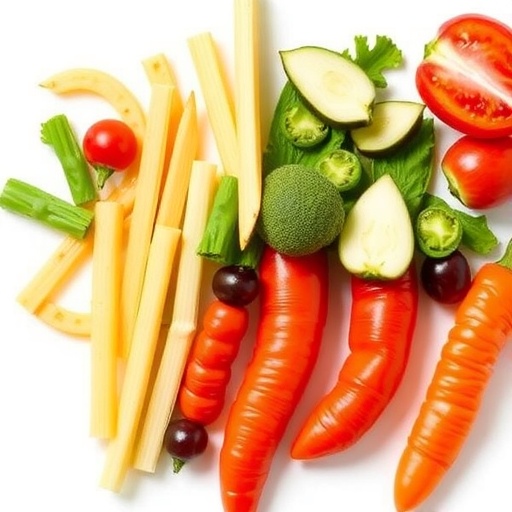In recent years, early-onset colorectal cancer has emerged as a growing public health concern worldwide, sparking numerous investigations into its underlying causes. Groundbreaking research published in JAMA Oncology sheds light on the intricate relationship between diet and the development of early-onset colorectal adenomas, precancerous lesions that serve as harbingers for colorectal malignancies. This extensive study meticulously examines the impact of ultraprocessed food consumption, revealing a compelling association between high intake levels and the increased risk of early-onset colorectal tumorigenesis.
This research draws its relevance from the alarming rise in colorectal cancer cases diagnosed before the age of 50. Unlike the traditional risk category dominated by older adults, the younger demographic’s mounting incidence calls for urgent exploration of modifiable lifestyle factors. Diet, a pivotal determinant of gastrointestinal health, emerges as a prime candidate for investigation. Ultraprocessed foods—defined as industrial formulations typically laden with additives, preservatives, and sugar—have been scrutinized for their adverse health effects. Their ubiquitous presence in contemporary dietary patterns warrants a rigorous evaluation of their potential carcinogenic role.
Implementing a robust epidemiological framework, the study involves the detailed dietary assessment of a diverse cohort, leveraging validated food frequency questionnaires to quantify ultraprocessed food intake. This rigorous methodology enables precise stratification of subjects based on consumption levels, permitting an analytical approach to detect correlations with colorectal adenoma formation. The research team employs advanced statistical modeling to adjust for confounders such as age, sex, physical activity, body mass index, and other dietary factors, thereby isolating the independent effect of ultraprocessed foods on adenoma risk.
The results reveal a striking dose-response relationship: individuals with the highest ultraprocessed food consumption exhibit a substantially elevated risk of developing colorectal conventional adenomas at young ages. This finding not only reinforces existing suspicions about dietary impacts on colorectal pathology but also highlights the specific vulnerability conferred by ultraprocessed foods. Molecular pathways implicated in neoplastic transformation—such as inflammation, oxidative stress, and dysbiosis of gut microbiota—may be exacerbated by the bioactive compounds and additives prevalent in these foods, fostering an environment conducive to tumor initiation.
Beyond statistical associations, the study delves into mechanistic hypotheses rooted in contemporary oncological science. Ultraprocessed foods often contain emulsifiers, artificial sweeteners, and flavor enhancers that can disrupt intestinal epithelial integrity and modulate immune responses. The resultant chronic low-grade inflammation is a recognized facilitator of neoplastic processes within colorectal tissues. Furthermore, alterations in microbial diversity due to diet-induced dysbiosis can impair mucosal barrier function and promote the accumulation of pro-carcinogenic metabolites, offering a plausible biological explanation for the observed epidemiological trends.
Importantly, this research underscores the critical need for public health policies targeting dietary quality improvement as a strategy to curb early-onset colorectal cancer’s trajectory. Encouraging reductions in ultraprocessed food intake, while promoting whole-food-based nutrition, aligns with broader cancer prevention paradigms. Nutritional counseling and educational campaigns could serve as vital tools to reshape dietary habits, particularly among younger populations who are increasingly exposed to ultraprocessed food marketing and availability.
From a clinical perspective, these findings advocate an integrated approach to colorectal cancer risk assessment that incorporates comprehensive dietary evaluations. Healthcare providers are urged to recognize the implications of ultraprocessed food consumption in their screening and preventive protocols, tailoring recommendations to mitigate modifiable risks. Early interventions could potentially delay or prevent adenoma development, thereby lowering incidence rates and improving prognostic outcomes.
This study also stimulates future research directions aimed at dissecting the heterogeneity of ultraprocessed foods and their distinct contributions to colorectal tumorigenesis. Delineating the roles of specific additives and processing techniques could inform targeted regulatory actions. Moreover, exploring gene-diet interactions may enhance personalized nutrition strategies, optimizing prevention efforts for genetically susceptible individuals.
The epidemiological evidence presented here harmonizes with a growing body of literature implicating poor dietary quality in colorectal carcinogenesis. It adds a nuanced perspective by focusing on early-onset cases, which have unique etiological and clinical characteristics compared to conventional late-onset cancer. The findings elevate the discourse around food processing’s biological impacts, emphasizing the intersection between modern dietary landscapes and cancer epidemiology.
As colorectal cancer remains a leading cause of cancer morbidity and mortality globally, translational efforts inspired by this research could reshape prevention frameworks. Integrating these insights into dietary guidelines, public health messaging, and clinical practice will be crucial to confronting the rising burden of early-onset colorectal cancer. This research thus represents a significant stride toward unraveling environmental and behavioral determinants of colorectal neoplasia.
In anticipation of future longitudinal studies and intervention trials, the current data establish a compelling foundation for advocating reduced ultraprocessed food consumption as a tangible, actionable objective. The multifaceted implications for cancer biology, dietetics, health policy, and patient care underscore the importance of this research in the contemporary fight against colorectal cancer.
For the scientific and medical communities, this research invites a paradigm shift that foregrounds dietary quality in the prevention of colorectal neoplasms, particularly among younger populations at mounting risk. By illuminating the deleterious role of ultraprocessed foods in early-onset colorectal adenoma formation, the study charts a critical course toward effective, evidence-based dietary interventions to mitigate a major public health challenge.
Subject of Research: Early-onset colorectal conventional adenomas and dietary risk factors, specifically ultraprocessed food intake.
Article Title: Higher Ultraprocessed Food Intake and Risk of Early-Onset Colorectal Conventional Adenomas
News Publication Date: Not explicitly stated in the provided content.
Web References: Not available.
References: (doi:10.1001/jamaoncol.2025.4777)
Keywords: Colorectal cancer, Foods, Risk factors, Cancer, Oncology, Adenomas, Tumorigenesis, Women’s studies, Dietetics, Diets, Data analysis




